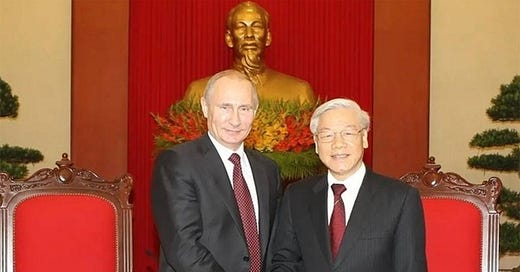On June 19-20, 2024, Russian President Vladimir Putin visited the Socialist Republic of Vietnam, where he met with To Lam, the President of Vietnam; with Prime Minister Pham Minh Chinh; with the General Secretary of the Communist Party of Vietnam Central Committee, Nguyen Phu Trong; and with the Chairman of the National Assembly of Vietnam, Tran Thanh Man. The highlight of the visit was the issuing of a joint statement on the further development of their comprehensive strategic partnership, which occurred on the thirtieth anniversary of the signing by the two nations of the Treaty on Foundations of Friendly Relations between Russia and Vietnam.

§
In comments to the media following the interchange with the Russian President, To Lam noted that the visit is taking place at th…


